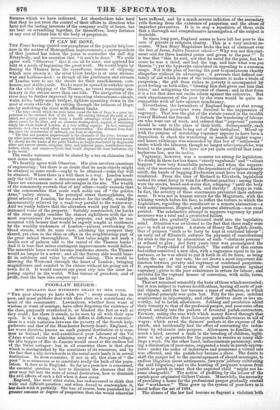IT CAN BE DONE.
THE Times having quoted our paraphrase of the popular helpless- ness in the matter of Metropolitan improvements, a correspondent of that journal has taken the pains to contradict the dull dog Everybody, and his assertion that "it can't be done." We quite agree with " Observer " that it can all be done, and applaud his hint at a mode of beginning the great work. He would begin by freeing the Thames from the superfluous burden of shipping which now crowds it : the river below bridge is at once stream- way and harbour-dock ; as though all the gentlemen and carmen of London were to use the streets for their coach-houses, cart- houses, and stable-yards. Docks must be opened in suitable spots for the whole shipping of the Thames, no vessel remaining sta- tionary in the stream more than one tide. The navigation of the river may be further improved by removing obstructions—shoals, weirs, locks, badly-made bridges, lighters squatting down in the mud at every ebb-tide ; by cutting through the isthmus of Dogs; also by endowing the river with efficient banks. "The large circuit which the river takes round the Isle of Dogs is a great im- pediment to the outward flow of the tide. By cutting through the neck of the island, and putting gates to the bend, a double advantage would be gained—a direct course for the river' and an immense floating-dock, capable of containing nearly the whole trade of London, at a very trifling expense. In fact, extremely moderate dock-dues would afford ample remuneratien. The distance from Lon- don, since the introduction of railways, can form no objection.
"The first and greatest improvement is the clearance of the river; because all the other improvements will most assuredly follow, apparently of their own accord. We should see the banks of the noble Thames no longer desecrated by disgraceful alleys and narrow streets, irregular, dirty, and indecent quay; tumbledown ware- houses, sheds, and cranes--cbjects that would disgrace the most barbarous city in the world."
The smoke nuisance would be abated by a tax on chimnies that emit dense smoke.
We heartily agree with Observer. His plan involves questions of engineering ; but there is no doubt that its main objects might be attained in some mode—ought to be attained—some day will be attained. Where there is a will there is a way. London needs only the will to assume a decorous aspect due to her greatness. There are uncommon natural advantages in the site. The wealth of the community exceeds that of any other—vastly exceeds that of the communities that made such noble use of "the golden .Arno," paltry stream. The principal street thoroughfares the great arteries of London, far too narrow for the traffic, would lbe immeasurably relieved by a road-way parallel to the water-way. And we verily believe that the alteration would pay itself in the increased value of the property.. Suitably constructed, the banks of the river might combine the utmost sightliness with the ut- most convenience for mercantile purposes, and might be sur- mounted with houses that would be eagerly sought as residences by the wealthy tradesmen of London—palaces overlooking the broad stream, with its open view, adorning the prospect they shared, yet close to the shop or office in the neighbouring part of the great inland thoroughfares. What value might not such a double row of palaces add to the rental of the Thames banks! And it is true that minor contingent improvements would follow. The miserable lanes would become handsome streets, the Thames would no longer be a sewer ; and all the Surrey side would bene- fit in salubrity and value by effectual diking. This would be drawing- the West-end through the heart of London ; bringing magnihcence and comfort to the citizen without his going out of town for it. It would convert our great city into the most im- posing capital in the world. What visions of grandeur, and of profit, does the bare idea conjure up !


























 Previous page
Previous page